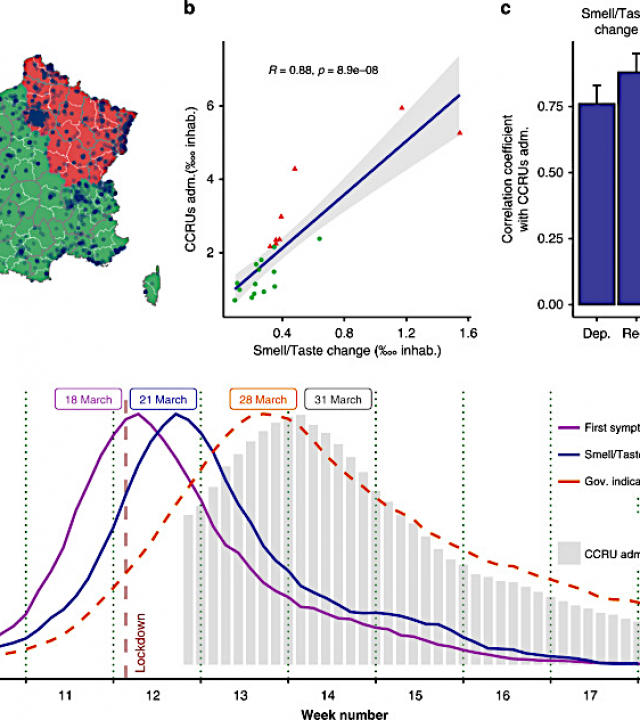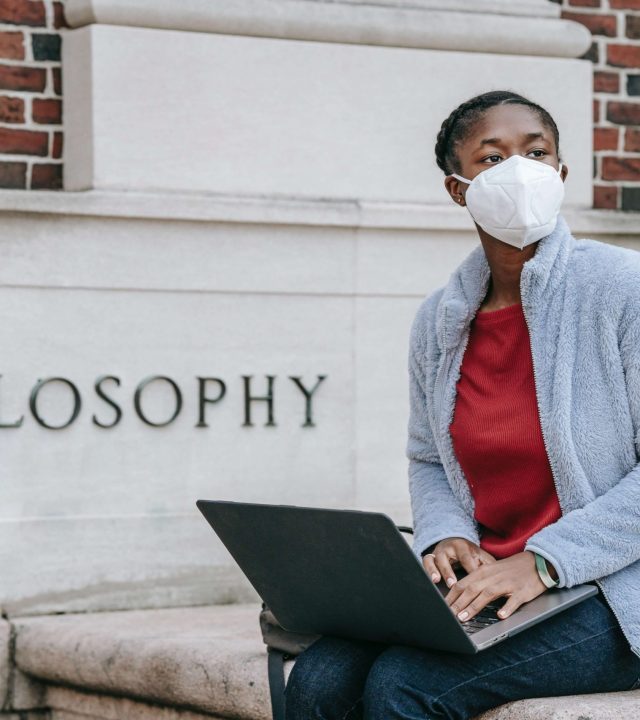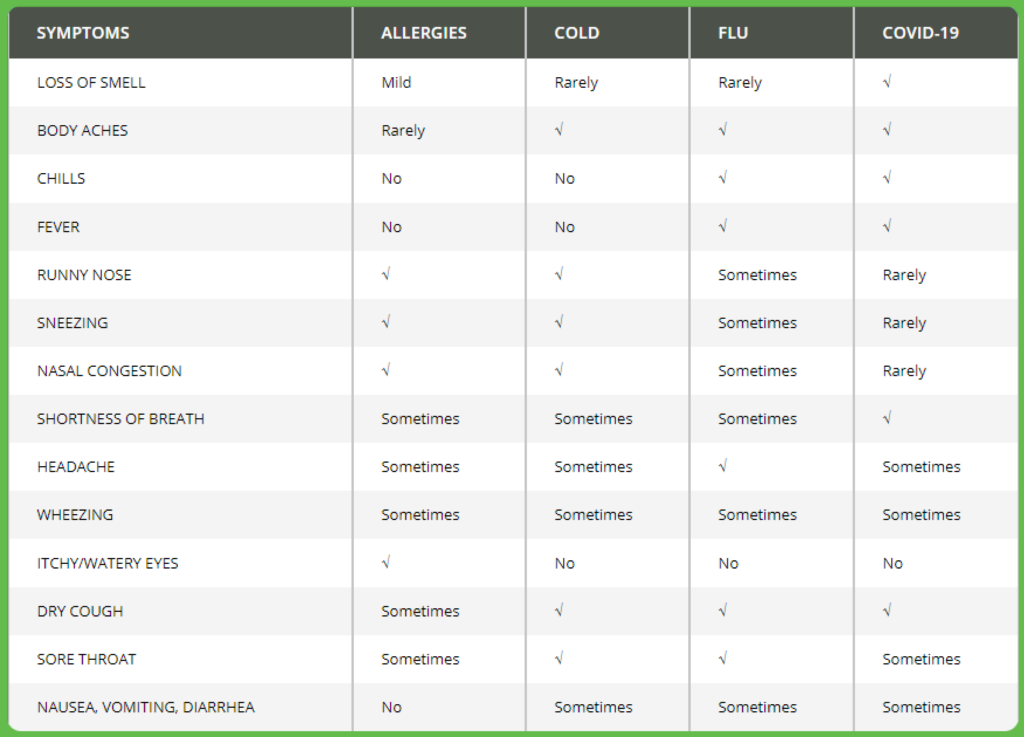The Science Behind Smell Testing And Why Experts Say It Is The MOST Effective COVID-19 Screening Factor
“Many times, loss of smell is a COVID-19 patient’s only symptom. Any symptom that can be tied directly to the disease becomes an important one to be aware of so that it can be used to guide testing and keep people from unknowingly spreading the disease.”
– Prof James Schwob, developmental, molecular, and chemical biology, Tufts University School of Medicine ᶦ

It’s The Most Reliable Indicator Of COVID-19 Infection
Unlike symptoms such as aching, coughing, and fatigue, a smell identification test is not self-reported data that the user can easily influence. According to research, often, the dysfunction is the only COVID-19 symptom that people register. A study published October 2020 by the NIH found that self-reported changes in smell were a better marker of the spread of infection than were other indicators tracked by governments.ᶦᶦ
It’s The Most Common Indicator Of COVID-19 Infection
We have long known that people can lose their sense of smell after other viral infections, such as the flu, but the percentage of people who have had this problem with COVID-19 is quite remarkable. Institute for Research in Fundamental Sciences administered a smell-identification test to 100 people with COVID-19 in which the patients sniffed odors and identified them on a multiple-choice basis. 96% of the participants had some olfactory dysfunction, and 18% had total smell loss (otherwise known as anosmia). Smell loss is so common in people with the disease that some researchers have recommended its use as a diagnostic test because it may be a more reliable marker than fever or other symptoms.ᶦᵛ


It’s The Earliest Indicator Of COVID-19 Infection
Screening Body Temp Or Sense Of Smell, Which Is Best?
It’s not even close. Experts from the Mayo Clinic, Harvard Medical School, NIH, CDC have all stated that testing for sense of smell is far more effective at identifying COVID-19 infections than temperature checks. In a recent study, Andrew Badley, physician and COVID research specialist at the Mayo Clinic, found that Covid-19 patients were 27 times more likely than others to have lost their sense of smell. But they were only 2.6 times more likely to have fever or chills, suggesting that anosmia produces a more precise signal and may therefore be a better Covid-catching net than fever. Anosmia is quite specific to Covid-19. Fever, in contrast, has many possible causes. Temperature checks are consequently far less reliable and far less effective.ᵛ Studies show that only about half of people with COVID-19 report loss of smell when simply asked about their symptoms. But when given a range of scents chosen to catch loss of smell, that number rises to eight in ten, even among people with no other symptoms. That’s far more prevalent than fever, which impacts fewer than one in four people with the virus. Plus, loss of smell lasts longer, affecting patients for a week or more, while fever may only last a day or two. "Fever Checks Are A Flawed Way To Flag Covid-19 Cases. Experts Say Smell Tests Might Help" . Stat News. 2 July 2020


Could Anything Else Cause Someone To Lose Their Sense Of Smell?
Allergies, colds, flu, and other viruses rarely, if ever, cause people to lose their sense of smell. When they do, it is accompanied by a runny nose, sneezing, and nasal congestion. It is rare for someone with COVID-19 to have any of those symptoms, let alone two or more. In a recent study of 1,480 patients led by otolaryngologist Carol Yan of UC San Diego Health, someone who lost their sense of smell was “more than 10 times more likely to have Covid-19 than other causes of infection. Nasal inflammation from some 200 cold, flu, and other viruses can cause it, but those causes come along with runny nose, sneezing, and watery eyes, which are exceptionally rare with COVID-19.ᵛᶦ Loss of smell without a stuffy nose is highly specific to COVID-19, possibly because the virus tends to enter the body and replicate via ACE2 receptors, which are highly abundant in cells in nasal passages believed to influence sense of smell.ᵛᶦᶦ
Could anything else cause someone to lose their sense of smell?

| SYMPTOMS | ALLERGIES | COLD | FLU | COVID-19 |
|---|---|---|---|---|
| LOSS OF SMELL | Mild | Rarely | Rarely | √ |
| BODY ACHES | Rarely | √ | √ | √ |
| CHILLS | No | No | √ | √ |
| FEVER | No | No | √ | √ |
| RUNNY NOSE | √ | √ | Sometimes | Rarely |
| SNEEZING | √ | √ | Sometimes | Rarely |
| NASAL CONGESTION | √ | √ | Sometimes | Rarely |
| SHORTNESS OF BREATH | Sometimes | Sometimes | Sometimes | √ |
| HEADACHE | Sometimes | Sometimes | √ | Sometimes |
| WHEEZING | Sometimes | Sometimes | Sometimes | Sometimes |
| ITCHY/WATERY EYES | √ | No | No | No |
| DRY COUGH | Sometimes | √ | √ | √ |
| SORE THROAT | Sometimes | √ | √ | Sometimes |
| NAUSEA, VOMITING, DIARRHEA | No | Sometimes | Sometimes | Sometimes |
Other Considerations
What About The Rest?
Should you test sense of taste?
How Quickly Does Sense Of Smell Return?
Why do people with COVID-19 lose their sensitivity to smells?
References
- “Something Wrong With Your Sniffer? It Could Be The Coronavirus”. Tufts Now. 11 December 2020.
- “Smell And Taste Changes Are Early Indicators Of The Covid-19 Pandemic And Political Decision Effectiveness”. NIH. 14 October 2020.
- “Covid’s Toll On Smell And Taste: What Scientists Do And Don’t Know”. Nature News. 14 January 2021.
- “Mysteries Of Covid Smell Loss Finally Yield Some Answers”. Scientific American. 18 November 2020.
- “Fever Checks Are A Flawed Way To Flag Covid-19 Cases. Experts Say Smell Tests Might Help” . Stat News. 2 July 2020.
- “Fever Checks Are A Flawed Way To Flag Covid-19 Cases. Experts Say Smell Tests Might Help” . Stat News. 2 July 2020.
- “How A Simple Smell Test Could Curb Covid-19 And Help Reopen The Economy”. Cu Boulder Today, 9 December 2020.
- “How Covid-19 Causes Loss Of Smell”. Harvard Medical School. 24 July 2020.
- “Covid’s Toll On Smell And Taste: What Scientists Do And Don’t Know”. Nature News. 14 January 2021.
